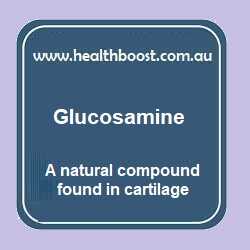Glucosamin:
 Glucosamine is a naturally occurring compound found in the human body. It plays a crucial role in building and maintaining cartilage, the flexible, rubbery tissue that cushions the bones at joints. It is primarily used as a dietary supplement and is often taken to support joint health and manage symptoms of osteoarthritis.
Glucosamine is a naturally occurring compound found in the human body. It plays a crucial role in building and maintaining cartilage, the flexible, rubbery tissue that cushions the bones at joints. It is primarily used as a dietary supplement and is often taken to support joint health and manage symptoms of osteoarthritis.
Here are some key points about glucosamine:
Joint Health: Glucosamine is believed to promote joint health by supporting the synthesis of cartilage and other joint tissues. It helps to maintain the structural integrity and function of joints, making it an essential component for joint health.
Osteoarthritis: Osteoarthritis is a common degenerative joint disease that occurs when the cartilage between bones wears down, leading to pain, stiffness, and reduced joint mobility. Glucosamine supplements are commonly used to alleviate the symptoms of osteoarthritis and potentially slow down its progression.
Forms: Glucosamine supplements are available in several forms, including glucosamine sulfate, glucosamine hydrochloride, and N-acetylglucosamine. Among these, glucosamine sulfate is the most commonly used form in dietary supplements.
Chondroitin: Often, glucosamine supplements are combined with chondroitin sulfate, another compound found in cartilage. Chondroitin is believed to have a synergistic effect with glucosamine and may also support joint health.
Sources: Glucosamine can be obtained from various sources, including shellfish shells (such as shrimp, lobster, and crab), as well as from fungi and some grains. People who are allergic to shellfish should exercise caution when taking glucosamine supplements and opt for non-shellfish sources.
Effectiveness: The effectiveness of glucosamine in managing osteoarthritis and joint pain is a topic of ongoing research and debate. While some studies have shown positive effects, others have been inconclusive or found minimal benefits. Individual responses to glucosamine may vary.
Dosage: The typical dosage of glucosamine varies depending on the specific form and the product being used. Common dosages range from 500 mg to 1500 mg per day, usually divided into multiple doses.
Side Effects: Glucosamine is generally considered safe for most people when taken as directed. However, some individuals may experience mild side effects such as digestive upset, nausea, or headaches. People with diabetes should be cautious as glucosamine may affect blood sugar levels.
Consultation with Healthcare Provider: Before starting any supplement, especially if you have a pre-existing health condition or are taking other medications, it’s important to consult with a healthcare provider to ensure it is safe for you and won’t interact with your current treatment.
Supplements are not a substitute for a balanced diet and healthy lifestyle. If you are experiencing joint pain or suspect you have a joint-related issue, it’s best to consult a healthcare professional for proper evaluation and personalized recommendations.
Fusion Glucosamine Premium Repair 100 Tablets .. Click
Fusion Glucosamine Advanced Repair 50 Capsules .. Click
